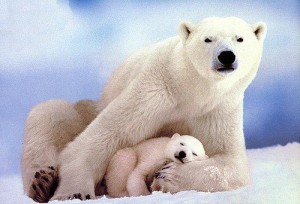The End of the World as We Know It
/https://tf-cmsv2-smithsonianmag-media.s3.amazonaws.com/filer/20110520102250venice-225x300.jpg)
Yes, I'm being a bit melodramatic in the headline, but every time that I read about the bad things that are predicted to happen—or already are happening—due to climate change, I worry. (And if you're about to leave a comment saying that climate change isn't real, please read this post about weather and climate first.) In the last month, I've come across half a dozen stories that give me pause:
The people of Venice thought that they would have their flooding problem fixed with a new floodgate system, but they might have breathed their sighs of relief too soon. A new study in the Journal of Climate Dynamics predicts that by the end of the century, the city's subsidence (i.e., sinking) combined with rising sea levels from climate change could increase the number of floods from four per year to between 20 and 250 per year. The floodgates alone may not be enough to protect the city, and even if they are, closing off the city from the sea would mean that pollution and untreated sewage would not be able to be flushed out as frequently. Ew.
City dwellers here in the United States have reason to worry, too. A new report from Physicians for Social Responsibility and the National Wildlife Federation warns that rising summer temperatures in urban areas (which will mean more frequent heat waves) could be particularly dangerous to children, the elderly and African-Americans, who are more likely to live in urban areas and be poor. Extreme heat can not only lead to death through heat stroke, but it also may exacerbate other problems, such as asthma.
The situation isn't any better down on the farm. Wolfram Schlenker of Columbia University and Michael Roberts of North Carolina State University in Raleigh looked at weather patterns and crop yields from 1950 to 2005 to predict how warmer temperatures might affect corn, cotton and soybeans. They found that the amount of time spent about 84 degrees F correlated with drops in yield. Based on current climate models, corn yields could decrease by 82 percent by the end of the century if greenhouse gas emissions continue apace.
Then there's the New York Times article about the threat of climate change to national security. "The changing global climate will pose profound strategic challenges to the United States in coming decades, raising the prospect of military intervention to deal with the effects of violent storms, drought, mass migration and pandemics, military and intelligence analysts say." Eek.
Those poor bears. A new analysis in the Journal of Zoology of polar bear skulls collected from 1892 to 2002 finds that the bears have shrunk by about nine percent over that time. The researchers say that stress from increased pollution and disappearing sea ice is the likely cause. As the sea ice shrinks, the bears have to spend more and more time searching for food.
And finally, the weirdest of possible outcomes from climate change: the tilt of the Earth could shift. As we learned in school, the Earth is tilted 23.5 degrees from vertical; this is why we have seasons. But that tilt can change over time. As ice melts, warmer water expands and water in general moves from one place to another—as is expected with climate change—the motion of that water an effect on the planet's tilt. It's a small effect—only about 1.5 centimeters per year—but combine that with the knowledge that the redistribution of the water's mass will have an effect on the Earth's spin. I find it a little scary that humans, through fossil fuels, can affect the world in such a way.
/https://tf-cmsv2-smithsonianmag-media.s3.amazonaws.com/accounts/headshot/Sarah-Zielinski-240.jpg)

/https://tf-cmsv2-smithsonianmag-media.s3.amazonaws.com/accounts/headshot/Sarah-Zielinski-240.jpg)

